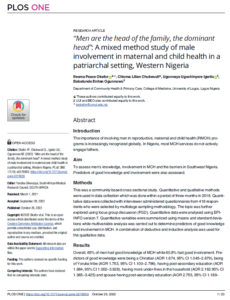
Introduction: The importance of involving men in reproductive, maternal and child health (RMCH) programs is increasingly recognized globally. In Nigeria, most MCH services do not actively engage fathers.
Aim: To assess men’s knowledge, involvement in MCH and the barriers in Southwest Nigeria. Predictors of good knowledge and involvement were also assessed.
Methods: This was a community-based cross sectional study. Quantitative and qualitative methods were used in data collection which was done within a period of three months in 2018. Quantitative data were collected with interviewer administered questionnaires from 418 respondents who were selected by multistage sampling methodology. The topic was further explored using focus group discussion (FGD). Quantitative data were analysed using EPI-INFO version 7. Quantitative variables were summarized using means and standard deviations while multivariable analysis was carried out to determine predictors of good knowledge and involvement in MCH. A combination of deductive and inductive analysis was used for the qualitative data.
Results: Overall, 65% of men had good knowledge of MCH while 60.8% had good involvement. Predictors of good knowledge were being a Christian (AOR 1.674, 95% CI 1.045-2.679), being of Yoruba tribe (AOR 1.753, 95% CI 1.100-2.796), having post-secondary education (AOR 1.984, 95% CI 1.002-3.928), having more under-fives in the household (AOR 2.162 95% CI 1.365-3.425) and spouse having post-secondary education (AOR 2.755, 95% CI 1.189-6.382). Predictors of good involvement in MCH include higher educational level of spouse: secondary (AOR 2.852, 95% CI 1.214-6.699), post-secondary (AOR 2.270, 95% CI 1.000-5.161) and having good knowledge of MCH (AOR 2.518, 95% CI 1.587-3.994). From the FGD, other factors which influence involvement were related to traditional/cultural orientation, time constraint and finance among others.
Conclusion: Men’s knowledge and their involvement in maternal and child health were sub-optimal. For improvement, community-based intervention programmes should be designed for men and implemented, taking into consideration their traditional/cultural roles, religious orientation, busy schedules, and educational backgrounds. They should be re-oriented on their patriarchally informed belief about their perceived roles in RMCH.